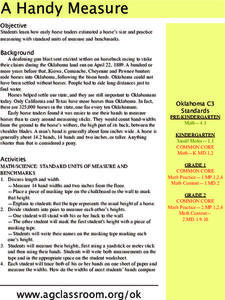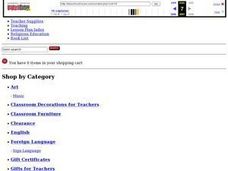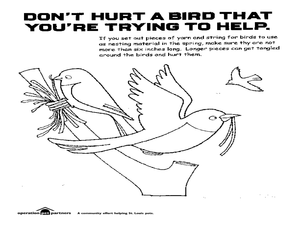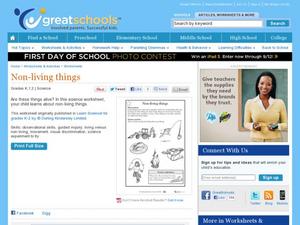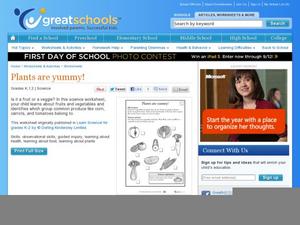Curated OER
Broken-Heart Matching Game
Learners use this fun game to practice, reinforce, or apply a wide variety of skills around Valentine's Day. Each students receives half a heart with zig-zag cuts made of pink construction paper with a piece of information. Their job is...
Baylor College
Plant or Animal?
Teach your class about the necessities of life using the book Tillena Lou's Day in the Sun. After a teacher-read-aloud, students make puppets depicting different plants and animals from the story and illustrating the habitat in...
Baylor College
Needs of Living Things: Pre-Assessment
Determine your class's prior knowledge about the necessities of life with this pre-assessment for a unit on living things. Learners draw pictures of themselves with all the things they need to live, grow, and survive. These drawings will...
Baylor College
Needs of Living Things: Post-Assessment
Assess your class's knowledge of the needs of living things with the final lesson in a series. Given a large piece of paper and coloring utensils, young scientists draw a picture of themselves and a plant or animal of their choosing,...
Baylor College
A Place to Be
Home sweet home. Humans, birds, beavers, ants, we all need a place place to rest and keep us safe. In the ninth lesson of this series, the importance of shelter is discussed as the teacher reads aloud the book Tillena Lou's Day in the...
Curated OER
A Handy Measure
Hold your horses! Young learners discover the history behind measuring the height of horses "by hands." They also study the history of Oklahoma, and how horses played such an important role in settling the state. An excellent worksheet...
Curated OER
Help the Duck Find Her Babies
Young scholars are introduced to a basic characteristic and need of living things-the ability and need to reproduce. They investigate how birds (and people) attract mates. Students discover how to build a nest. They discuss the needs and...
Curated OER
Moth or Butterfly
Students categorize butterflies and moths by identifying the unique characteristics of the two different species. In this classifying lesson plan, students discuss their prior knowledge about these insects before...
Curated OER
Children's Literature Across the Curriculum Ideas-The Wheels on the Bus
Students read The Wheels on the Bus by Maryann Kovalski. They complete a variety of cross-curricular activities surrounding the study of travel and transportation. Included are reading, art, math, science, writing, social studies, and...
Curated OER
Children's Literature Across the Curriculum Ideas-The Christmas Miracle of Jonathan Toomey
Young scholars read The Christmas Miracle of Jonathan Toomey by Susan Wojacieckowski. They complete a variety of cross-curricular activities surrounding the Christmas holiday. Included are reading, art, math, science, writing, social...
Curated OER
Children's Literature Across the Curriculum Ideas-Hanukkah Lights, Hanukkah Nights
Learners read Hanukkah Lights, Hanukkah Nights by Leslie Himmelman. They complete a variety of cross-curricular activities surrounding the study of Hanukkah. Included are reading, art, math, science, writing, social studies, and library...
Alabama Learning Exchange
Heads, Shoulders, Knees, and Toes
The identification of various parts of the human body is the focus of this biology lesson. Young scientists sing the song "Head, Shoulders, Knees, and Toes," and trace the human body onto butcher paper. Additionally, they label the parts...
Curated OER
Lesson Plan fo The Magic Eyes of Little Crab
Interested in a "how and why" story to read with young students? In this storytelling lesson, readers will discuss sea creatures, focusing on practicing new terminology through retelling the story. This resource provides a list of...
Curated OER
Daily Survival Requirements of Water
Students will use inquiry science to complete an investigation. They create hypotheses predicting the changes water undergoes in becoming ice and determine how much ice needs to be melted to create one 8 oz. glass of water.
Curated OER
Monarch Egg
Students investigate the stages of the Monarch butterfly and its life cycle. In this butterfly life cycle lesson, students discuss when, where, and how the Monarch butterflies lay their eggs. After discussion, students...
Curated OER
The Ogre Bully
First graders complete activities with the story The Ogre Bully. In this literature lesson, 1st graders discuss opposite words and then read the story. They answer questions for comprehension and complete phonics activities and...
Curated OER
Storms and Extreme Weather
Students explore hurricanes and tornadoes by conducting an experiment. In this weather pattern lesson, students define many extreme weather vocabulary terms and discuss the relationship with static electricity. Students utilize plastic...
Curated OER
Sorting Lids
Young scholars practice sorting lids in different ways so that each group determines a sorting pattern. They examine how to work in groups while sharing ideas. They establish group work relationships that become apparent to the teacher...
Curated OER
This is for the Birds!
Learners complete activities to investigate wild birds. For this bird study lesson, students make a wild bird feeder to examine the proper ways to care for wild birds. Learners explore organizations in their community that help wild...
Curated OER
Build Your Own Bug
Students create a unique bug. In this lesson plan about bugs, students use their imagination to develop a new kind of bug. Students use construction paper, scissors, glue, and crayons to make their bug. Students explore the different...
Curriculum Corner
African American Inventors
Celebrate Black History Month with a packet of materials on African American inventors. Readers discover several inventors' character traits, their inventions, and their lives. They even have the opportunity to conduct further research...
Curated OER
Non-living Things
Very young scientists circle the things on the worksheet that they think are living things. Most of the pictures are of non-living things. A handy worksheet to use during any initial discussion about living vs. non-living things.
Curated OER
Plants are yummy!
Is it a fruit or a vegetable? Youngsters place an F next to each fruit they see and a V next to the vegetables. Corn is tricky. It is a grass, so it's actually not a fruit or a vegetable, but a grain!
Curated OER
Money in Action
Students become familiar with the various coins in our money system as well as amount of each coin. They help develop their ability to count change and find different ways to show equal amounts.





